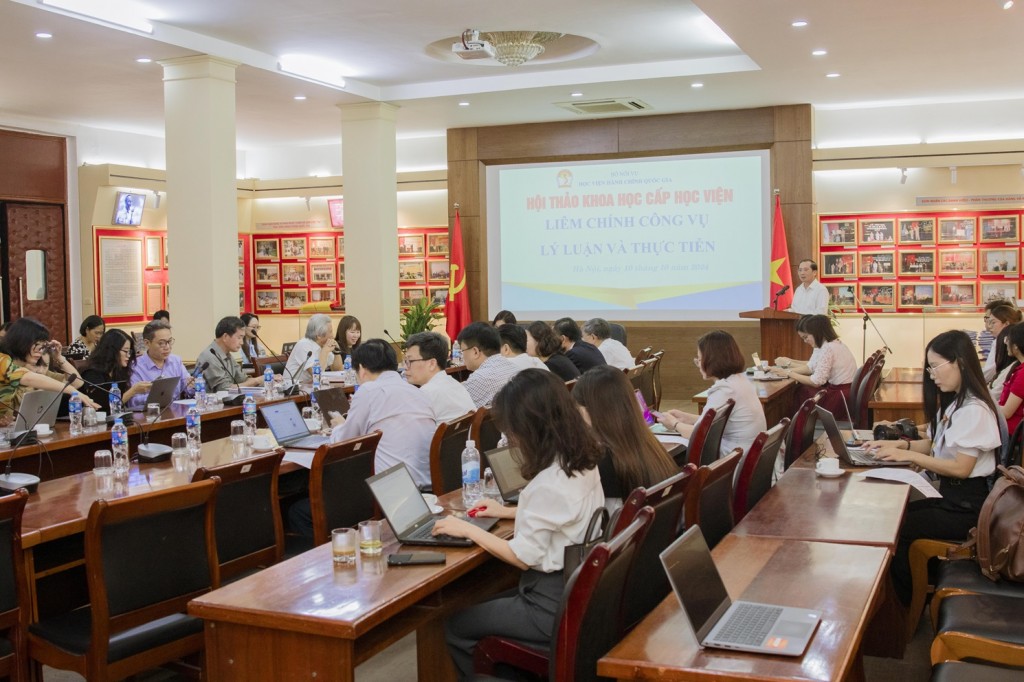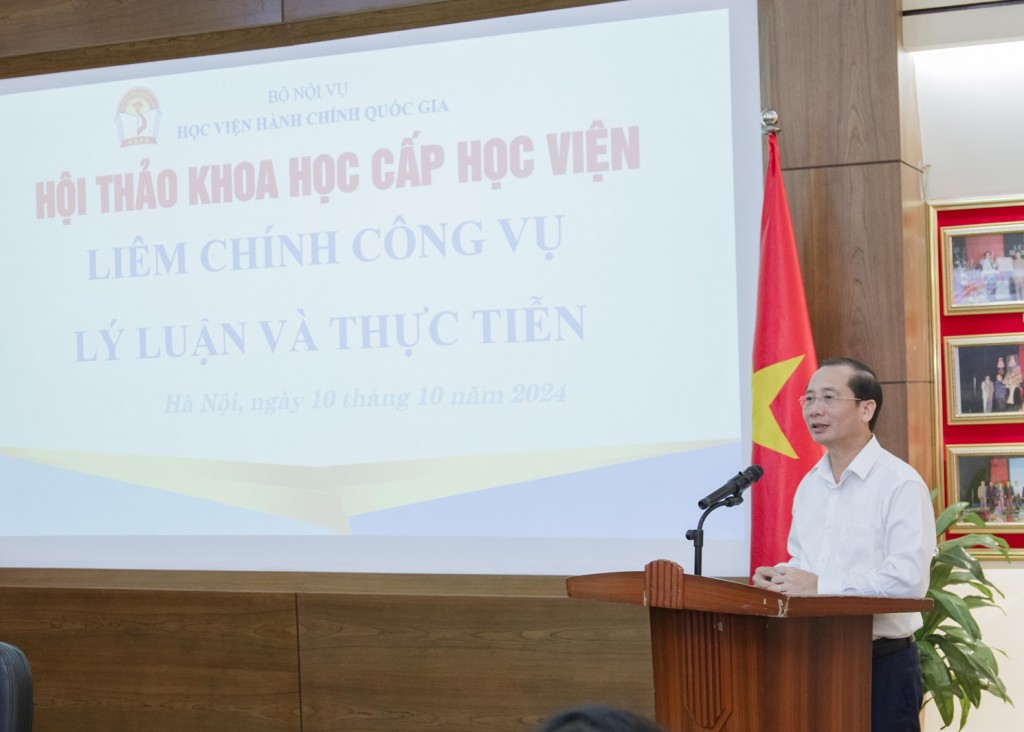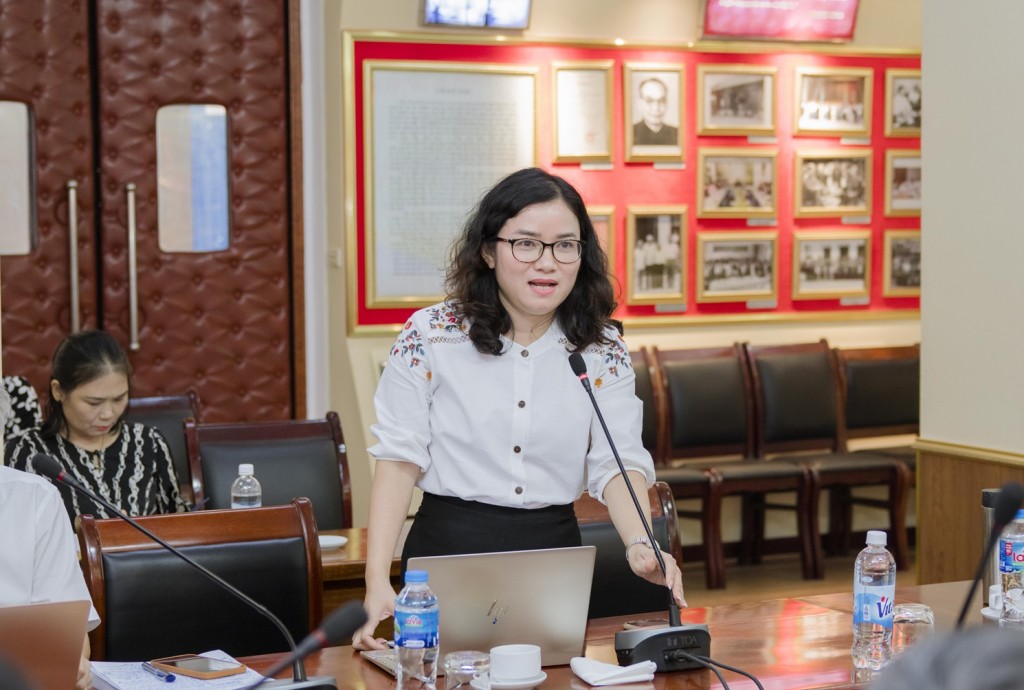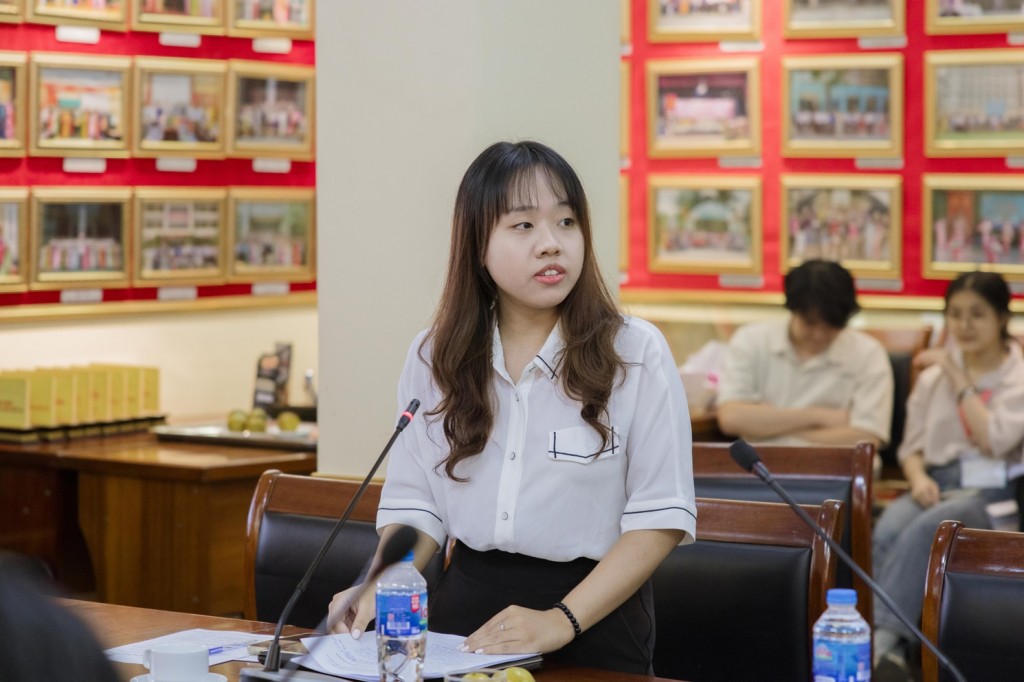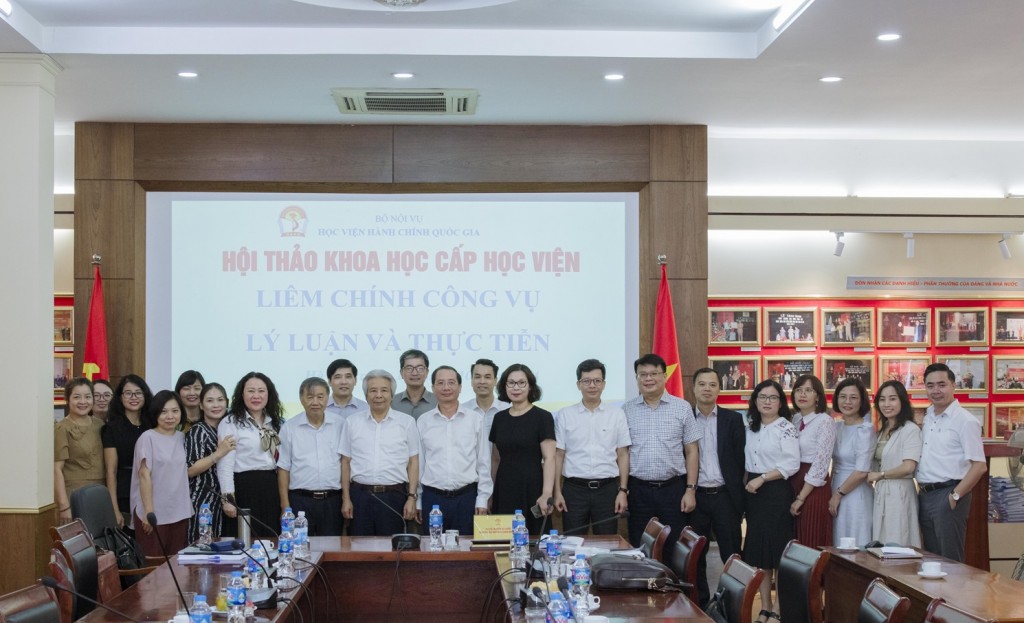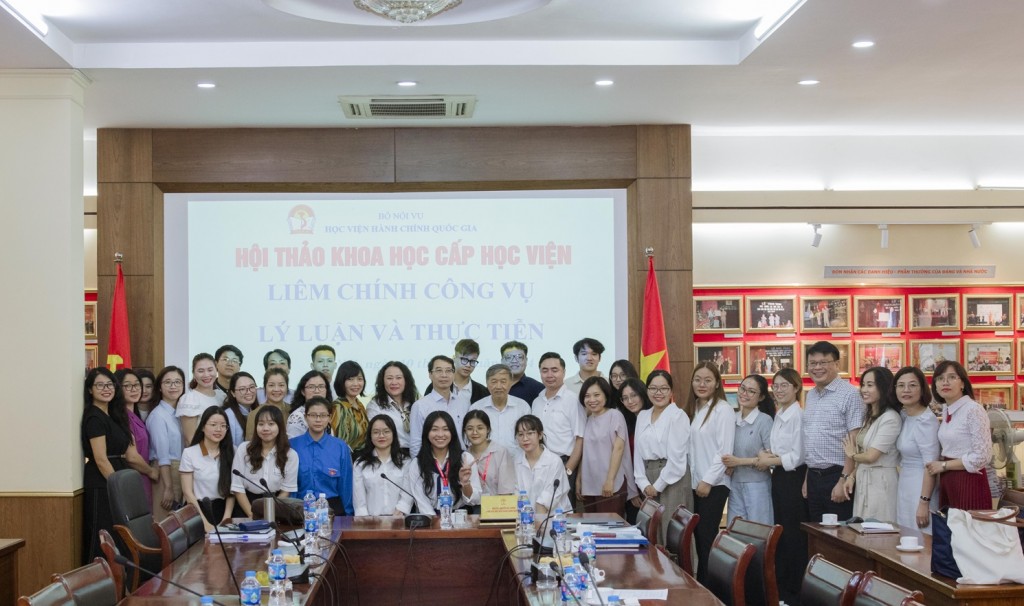On October 10, 2024, at NAPA Headquarters in Ha Noi, the National Academy of Public Administration (NAPA) held a workshop titled “Public Service Integrity – Theory and Practice.” The workshop was co-chaired by Assoc. Prof. Dr. Nguyen Ba Chien, NAPA President, and Dr. Nguyen Thu An, Deputy Dean of the Faculty of State and Law. The workshop was organized both in person and online.
Attending the workshop were delegates including Prof. Dr. Vo Khanh Vinh, former Vice President of the Viet Nam Academy of Social Sciences; Prof. Dr. Pham Hong Thai, former Dean of the Faculty of Law, Viet Nam National University, Ha Noi; Prof. Dr. Vu Cong Giao from the University of Law, Viet Nam National University, Ha Noi; Dr. Dinh Van Minh, former Director General of the Department of Legal Affairs, Government Inspectorate; Dr. Hoang Thi Ngan, former Director General of the Department of State Administrative Organization and Public Affairs, Government Office; Assoc. Prof. Dr. Truong Thi Hong Ha, Deputy Director General of the General Research Department, Central Party Commission for Internal Political Affairs; and Mr. Pham Ngoc Thach, Deputy Director of the Department of Legal Affairs, Viet Nam Chamber of Commerce and Industry (VCCI).
Representing NAPA were Assoc. Prof. Dr. Luong Thanh Cuong, NAPA Vice President; leaders of various departments within NAPA; and a large number of lecturers, students, and trainees from the Faculty of State and Law.
In his opening remarks, Assoc. Prof. Dr. Nguyen Ba Chien stated that the workshop on “Public Service Integrity – Theory and Practice” was being held at a time when the Party of Viet Nam is strongly committed to building and regulating itself, combating ideological degradation, “self-evolution,” and “self-transformation,” as well as fighting corruption and negative phenomena. The Party’s Regulation No. 144-QĐ/TW, issued on May 9, 2024, on the new era’s standards of revolutionary ethics for Party members, emphasizes the self-discipline of officials and Party members, contributing to the formation of a team of officials with integrity and self-respect. Resolution No. 27-NQ/TW, which calls for the continued building and completion of the Socialist rule-of-law state in the new period, along with the Government’s Resolution No. 33/NQ-CP of May 9, 2016, also sets out the goal: “…Building a clean, transparent government that fosters development. The government should be servants of the people, connected with the people, and serving the people…” The institutionalization of regulations and the implementation of integrity in public service activities have been carried out through various legal documents, such as the Law on Cadres and Civil Servants, the Law on Public Employees, the Law on Anti-Corruption, and the Law on Thrift Practice and Anti-Waste. However, there remain many issues and gaps in scientific research, theoretical studies, and legal adjustment mechanisms that need further exploration.
With its mission as the national center for training high-quality human resources and fostering administrative, leadership, and management capacities for Viet Nam’s public service, while also engaging in policy research and consultancy, NAPA has always recognized its responsibility to take the lead in groundbreaking research in administrative science, public service and civil servants, administrative reform, public policy, and administrative law. NAPA is also involved in training a team of officials and civil servants capable of meeting the demands of a professional, dynamic, transparent, efficient, and effective public administration system.
Assoc. Prof. Dr. Nguyen Ba Chien expressed his hope that the workshop participants would focus on the following key topics:
(1) The importance of public service integrity in building a fair and transparent public administration system.
(2) Identifying the theoretical and legal issues surrounding public service integrity.
(3) Public service integrity value standards in various countries around the world and implications for Viet Nam.
(4) Evaluating and linking the current legal framework on integrity in public service in Viet Nam, analyzing and clarifying research on public service integrity, and providing suggestions for legal improvements.
(5) Other in-depth topics related to public service integrity.
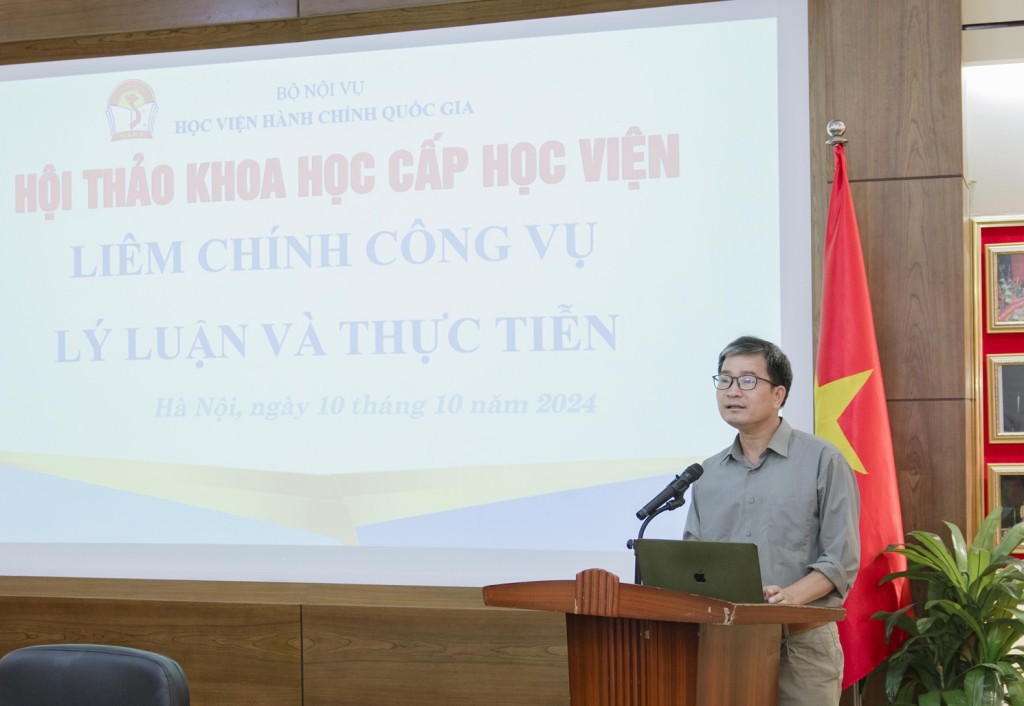
Prof. Dr. Vu Cong Giao from the University of Law, Viet Nam National University, Ha Noi, presenting at the workshop.
In his presentation titled “OECD’s Strategy for Promoting Public Integrity and Implications for Viet Nam,” Prof. Dr. Vu Cong Giao focused on the role and content of enhancing integrity in relation to anti-corruption strategies in OECD countries. He analyzed two key documents from the organization: the OECD Council Recommendation on Public Integrity and the OECD Handbook on Public Integrity. He also provided suggestions on directions and solutions to promote public integrity in Viet Nam’s public sector in the coming years.
According to him, to promote integrity in particular and build a culture of integrity in general in Viet Nam in the future, it is essential to study and apply international experiences, especially from OECD countries. Key lessons from these countries that Viet Nam could consider for its strategy to promote integrity include: (1) Rethinking anti-corruption approaches; (2) Developing a specific strategy for promoting public integrity; (3) Ensuring that the public integrity strategy is comprehensive, cohesive, but also focused and targeted; (4) Encouraging the participation of the public, social organizations, and businesses in the public integrity strategy.
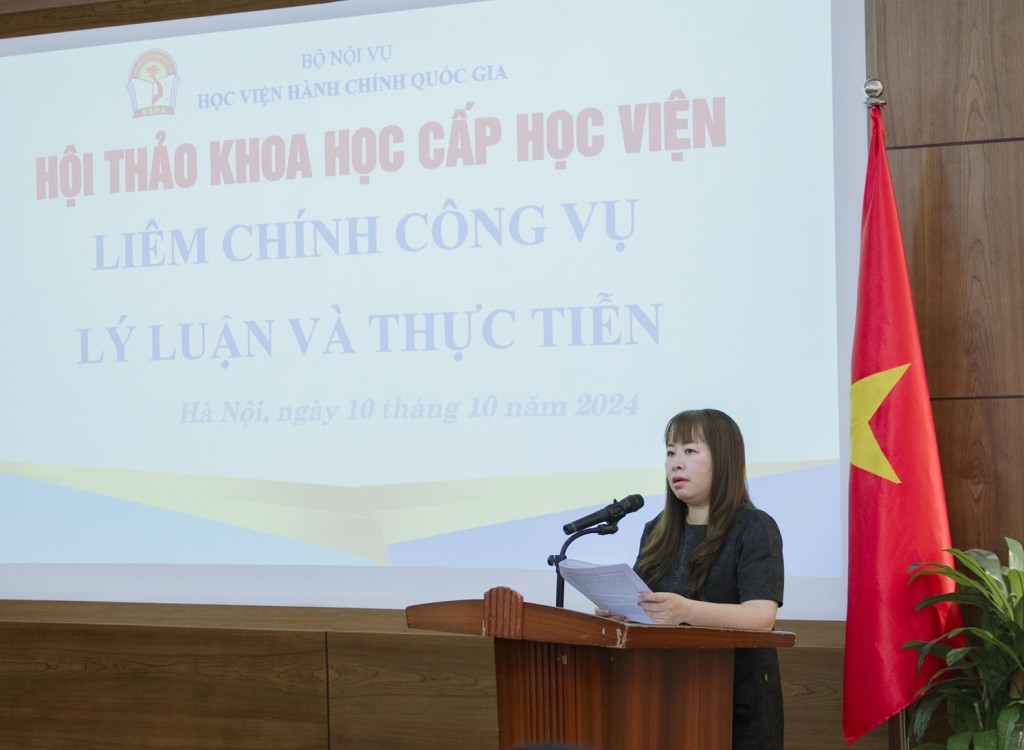
Assoc. Prof. Dr. Truong Thi Hong Ha, Deputy Director General of the General Research Department, Vice President of the Science Council, Central Party Commission for Internal Political Affairs, presenting at the workshop.
At the workshop, Assoc. Prof. Dr. Truong Thi Hong Ha presented a paper titled “Building a Culture of Public Service Integrity – Experiences of South Korea and Implications for Viet Nam.” According to her, building a culture of public service integrity, including educating public officials, civil servants, and Party members on integrity, plays a crucial role in strengthening both the Party and the State. The 13th National Party Congress emphasized the need for officials, Party members, and public servants to “cultivate honesty, build a culture of thrift, and avoid corruption and wastefulness.” She analyzed several theoretical issues on building a culture of integrity, integrity education, and South Korea’s experience in promoting integrity culture. She compared this to Viet Nam’s recent efforts, especially in the last 10 years, in educating public officials, Party members, students, and proposed solutions for further developing a culture of public service integrity.
From South Korea’s experience, she identified several key implications for Viet Nam in the upcoming phase: (1) Recognizing the role and importance of a culture of integrity, emphasizing public service integrity in society. It is essential to unify awareness and highlight the role, prestige, and value of public service in national development; (2) In training officials and civil servants, public service integrity should be closely linked to efforts to prevent corruption and negative behaviors, contributing to a cleaner government and enhancing the reputation of the public sector; (3) Building public service integrity on a legal basis, requiring mandatory integrity training, with assessments, evaluations, rankings, rewards, and criticisms conducted publicly each year.
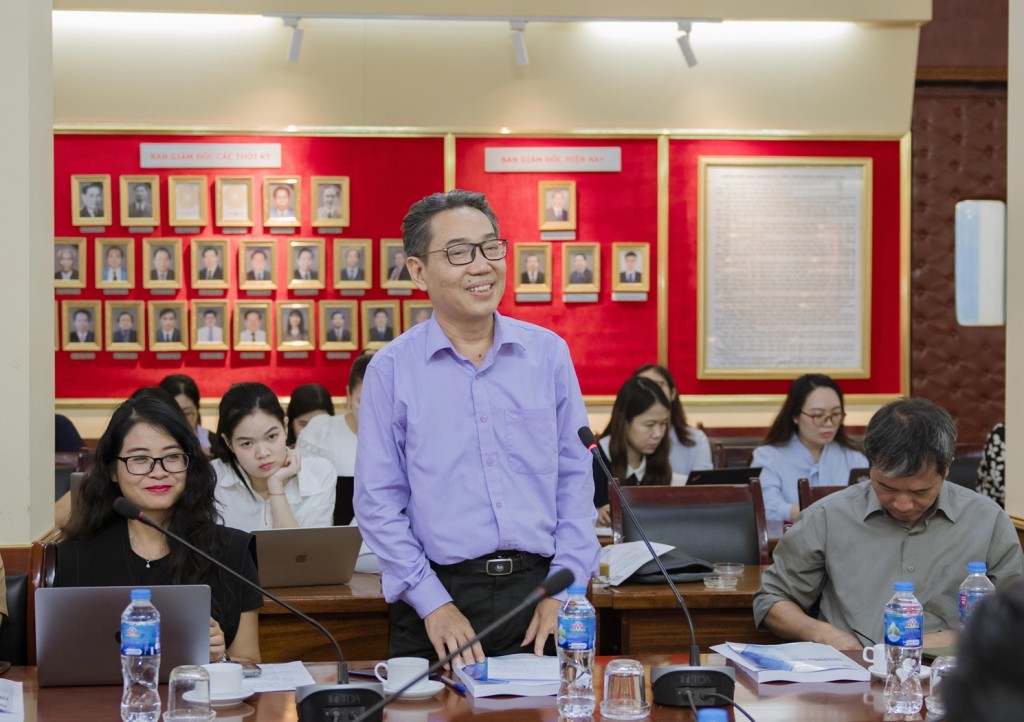
Dr. Dinh Van Minh, former Director General of the Department of Legal Affairs, Government Inspectorate, presenting at the workshop.
Dr. Dinh Van Minh presented a paper titled “Enhancing Public Service Integrity Ethics in the Current Situation.” He affirmed that integrity is a universal requirement for public services worldwide. In Viet Nam, in recent years, the political, ethical, and legal violations of a portion of officials and Party members have diminished public trust in the Party, the State, and the public sector, especially regarding integrity in public service. This has negatively affected the efficiency and effectiveness of state management. Thus, according to him, it is necessary to clarify the content, urgency, and solutions to enhance integrity in public service in the near future. To improve public service ethics, several solutions should be implemented:
(1) Fully implementing and strengthening the education of officials and civil servants to rigorously follow Regulation No. 144-QĐ/TW, dated May 9, 2024, on the ethical standards for officials and Party members in the new era, especially the principles of diligence, thrift, integrity, and impartiality (Article 3 of the Regulation).
(2) Continuing to improve the institutional framework for public service ethics. There should be specific and comprehensive regulations on ethical standards for various types of officials and civil servants, forming the basis for gradually perfecting a public service ethics framework, ultimately leading to a Law on Public Service Ethics .
(3) Strengthening inspection, supervision, and disciplinary measures in public service activities, increasing administrative discipline, and combating corruption and negative behaviors. Violations of public service ethics should be strictly penalized according to the severity, including criminal liability where applicable.
(4) Paying attention to the material and non-material well-being of officials and civil servants, ensuring that they have the conditions and motivation to fully commit to their work, not swayed by financial temptations in a dynamic and challenging market economy.
(5) Building a foundation of social integrity based on the core cultural values of the nation in the new era.
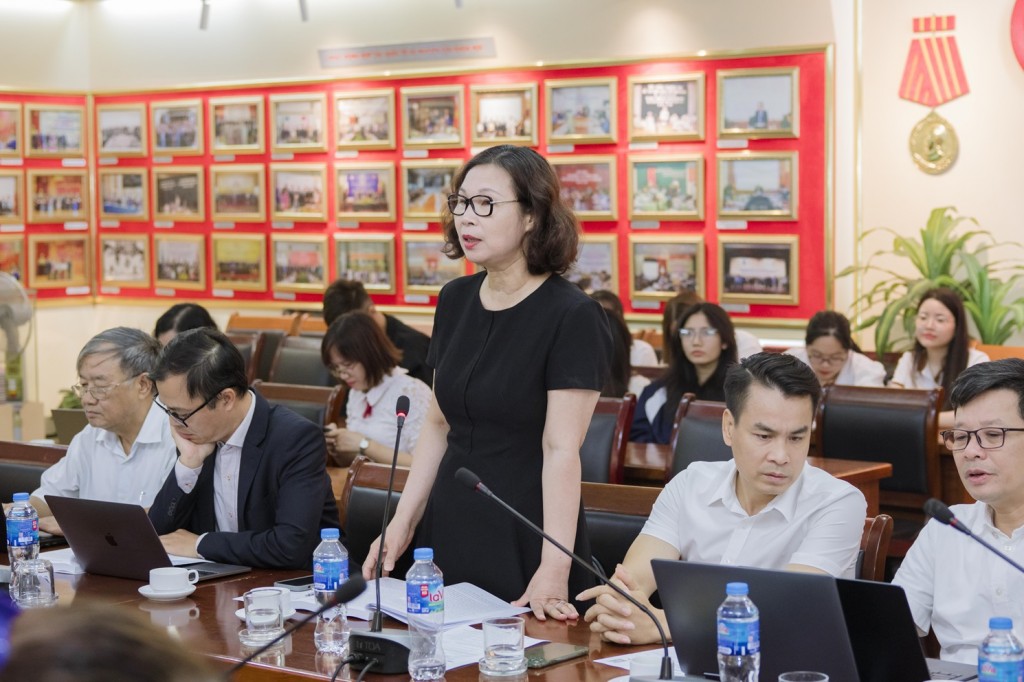
Dr. Hoang Thi Ngan, former Director General of the Department of State Administrative Organization and Public Affairs, Government Office, presenting at the workshop.
Dr. Hoang Thi Ngan presented a paper titled “Improving Public Service Law in the Spirit of Integrity.” As a category rich in ethical values, public service integrity has been reflected in several aspects of the Law on Cadres and Civil Servants and related documents on public service activities, such as the Law on Anti-Corruption, the Law on Practicing Thrift and Combating Wastefulness, and the Public Office Culture Regulations. According to her, several issues in improving public service and civil service law in the spirit of integrity include views on building a transparent civil service, principles of recruitment and organization, public service ethics, and the training, evaluation, and disciplining of civil servants.
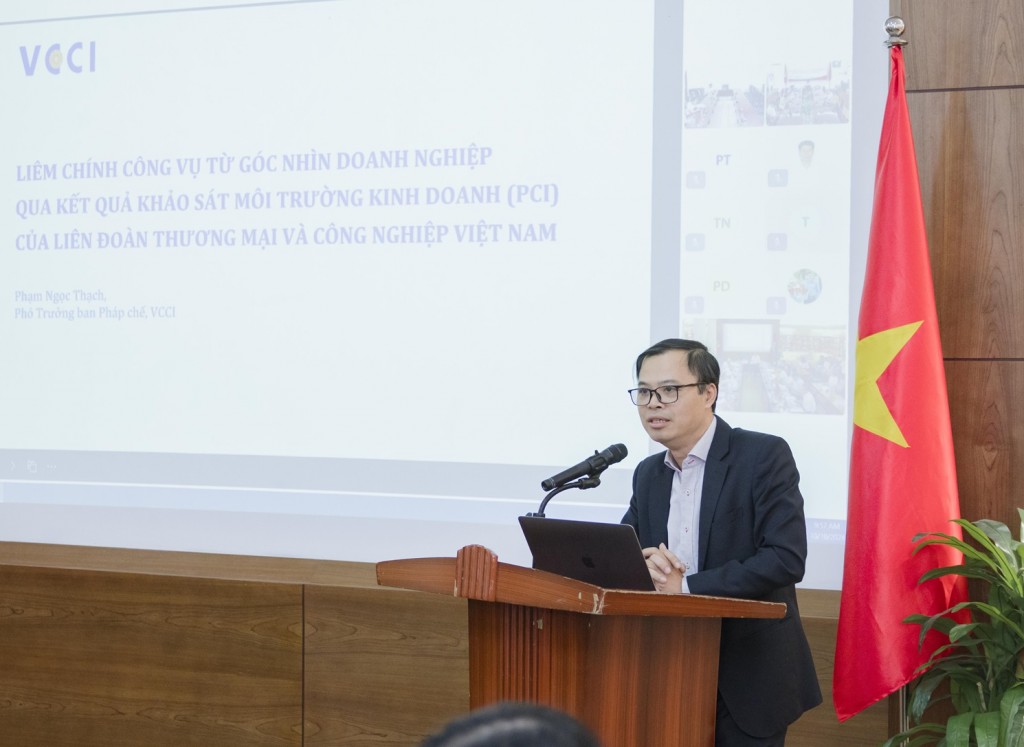
Mr. Pham Ngoc Thach, Deputy Director of the Department of Legal Affairs, Viet Nam Chamber of Commerce and Industry (VCCI), presenting at the workshop.
Mr. Pham Ngoc Thach shared the perspective of businesses on public service integrity based on the VCCI’s survey results of the business environment (PCI). Through an analysis of evaluation indicators, including unofficial costs borne by businesses during operations, he noted that corruption and negative practices are improving, reflecting positive changes in Viet Nam’s efforts to combat corruption and enhance public service ethics. However, he suggested that to further promote sustainable economic development, solutions are needed to reduce unofficial costs and foster business growth.
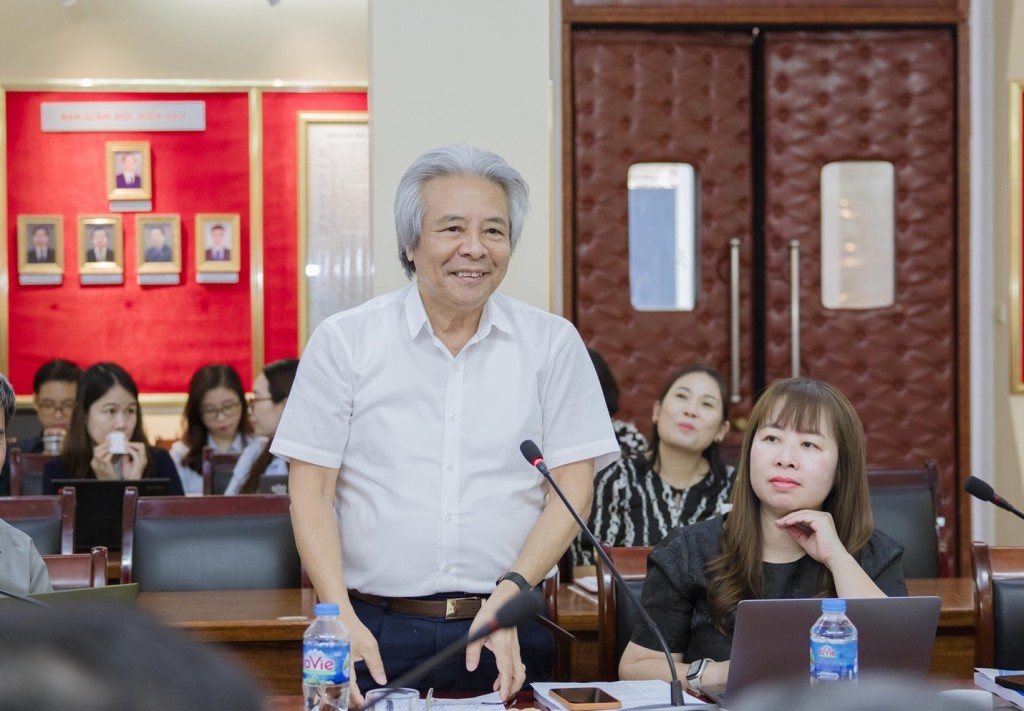
Prof. Dr. Vo Khanh Vinh, former Vice President of the Viet Nam Academy of Social Sciences, speaking at the workshop.
Prof. Dr. Vo Khanh Vinh raised the need to elevate the perception of integrity as a “value” in research development. He proposed a research framework for public service integrity, examining theoretical aspects of integrity from various angles. He emphasized the importance of recognizing integrity as a fundamental value, identifying its influences, and studying its manifestations, causes, and characteristics in Viet Nam. He also highlighted the need to learn from international experiences and develop a strategy to promote public service integrity.
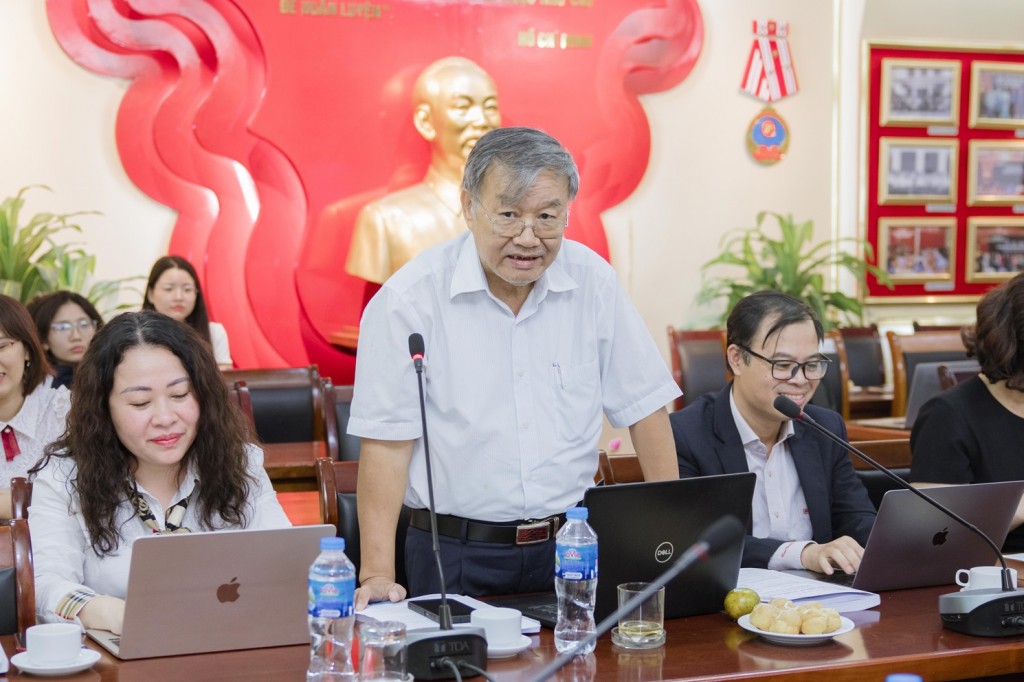
Prof. Dr. Pham Hong Thai, former Dean of the Faculty of Law, Viet Nam National University, Ha Noi, speaking at the workshop.
Agreeing with Prof. Dr. Vo Khanh Vinh, Prof. Dr. Pham Hong Thai reaffirmed that integrity is a universal value recognized by humanity. Integrity can be approached from multiple dimensions: as a general ethical issue, from the perspective of public service ethics, in relation to the economy, or through a political and historical lens. When studying public service integrity, it should be viewed holistically in relation to legal drafting, law enforcement, and judicial activities.
In his paper titled “Diligence, Thrift, Integrity, and Honesty in the Thought of President Ho Chi Minh and Its Application in Public Service,” Dr. Truong Cong Hoa, Acting Director of the NAPA – Ho Chi Minh City Campus, affirmed that studying and applying Ho Chi Minh’s thoughts on these values is of great significance for public service today. It helps to build a public service that is both ethical and competent, meeting the expectations of the people. In his paper, he proposed several solutions to apply Ho Chi Minh’s thoughts in building public service integrity, such as: (1) Effectively implementing policies for training public officials; (2) Renewing and strengthening Party leadership at all levels; (3) Enhancing the importance of public relations (PR) activities; (4) Resolutely fighting corruption, negative behaviors, bureaucracy, and wastefulness; and (5) Emphasizing the spirit of self-criticism and criticism.
Dr. Tran Quyet Thang from the NAPA – Quang Nam Campus shared a presentation on “The Quy Tam Lawsuit – A Mechanism for Public Participation in Ensuring Integrity in Public Service in Viet Nam.” Quy Tam is a legal framework that allows citizens to engage in fair litigation in court. Courts recognize these individuals as legitimate plaintiffs based on the law, giving them the right to argue and monitor the entire trial process, rather than just reporting corrupt behavior to relevant authorities without being involved in the conclusion process.
According to Dr. Le Thi Hoa, controlling conflicts of interest is considered an effective measure to improve public service operations and plays a vital role in building a transparent public administration, which is highly valued globally. Based on her research on regulations related to managing conflicts of interest in public service, she proposed several solutions to enhance control over conflicts of interest, helping to prevent and reduce corruption among civil servants during public service execution.
Miss Le Nguyen Phuong Thuy presented on identifying theoretical and legal issues concerning public service integrity. She highlighted several limitations in the practical enforcement of current laws on public service integrity in Viet Nam. She identified the causes and proposed several solutions to promote public service integrity, including (1) Unifying awareness and ensuring political determination in establishing and implementing standards of integrity in public service; (2) Continuing to supplement and improve laws on integrity; (3) Allocating resources to implement legal regulations on integrity; (4) Focusing on the human factor, as they are the central subject of integrity; (5) Improving the quality of the public service environment.
Concluding the workshop, Assoc. Prof. Dr. Nguyen Ba Chien expressed his deep gratitude to the delegates and scientists for their interest, participation, and valuable contributions to the workshop discussions, which helped clarify the topics related to the workshop’s theme. With 34 papers compiled in the proceedings and numerous direct discussions at the event, new approaches were suggested for understanding the concept of integrity as a “cultural value,” providing a more comprehensive and profound view of the theoretical and practical aspects of integrity. Practical proposals were made to continue fostering a culture of integrity and enhancing ethical integrity in public service. The workshop results will be seriously considered by the organizing committee and will serve as a valuable foundational knowledge base and scientific rationale for NAPA to continue its research, improve the quality of teaching and training, and contribute to policy proposals and consultations.


